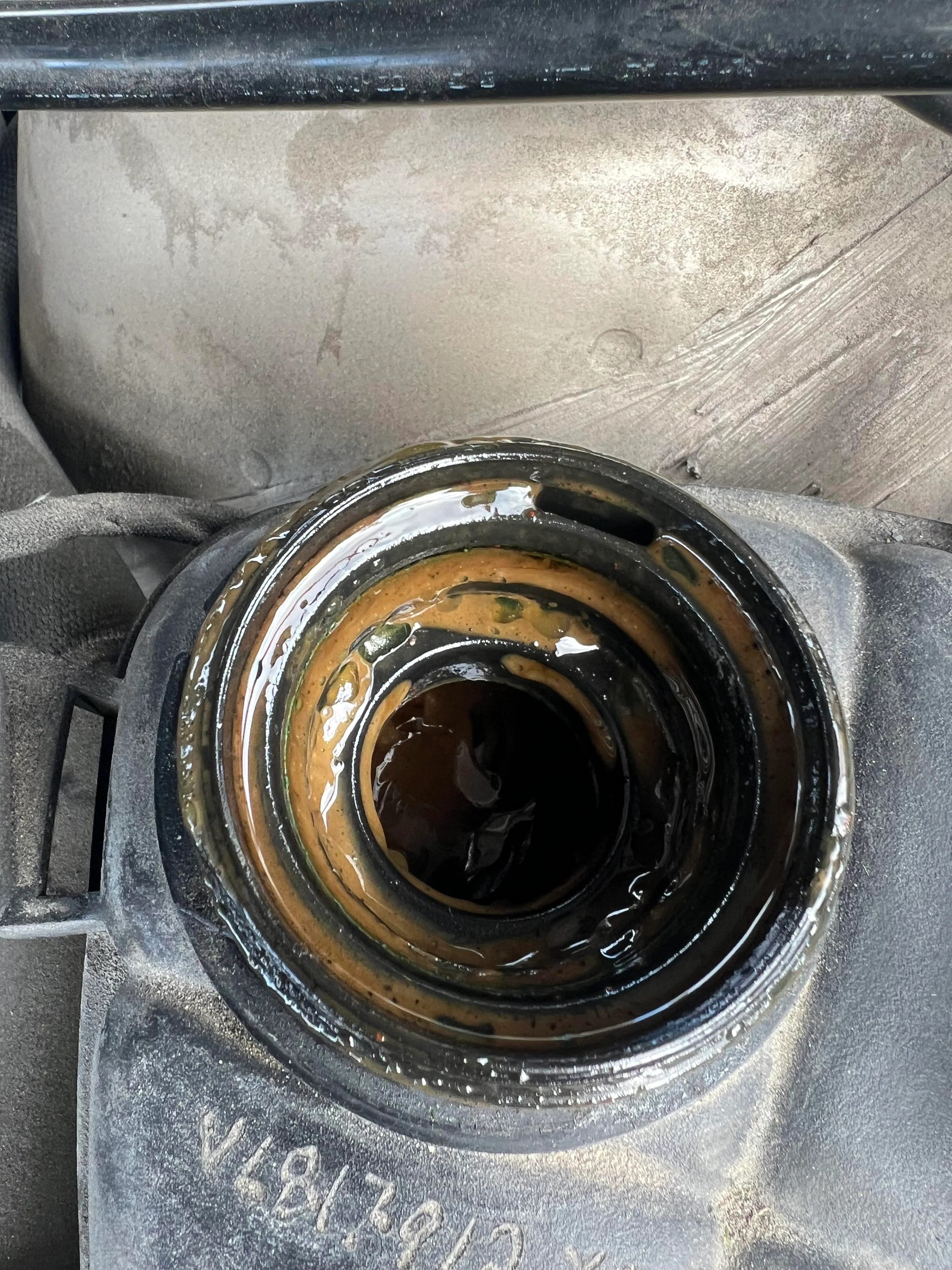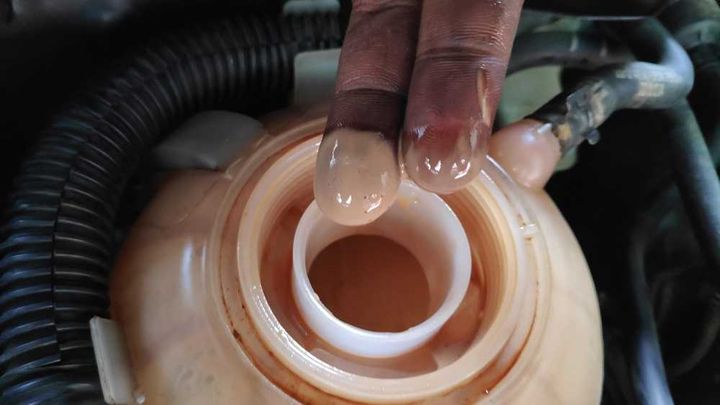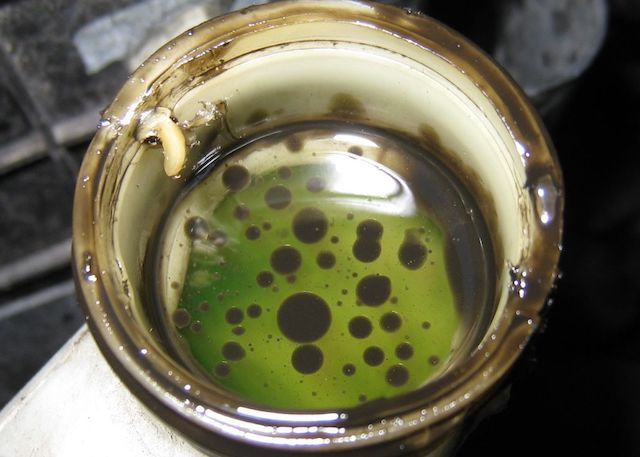


Mixing oil and coolant in your vehicle's engine can lead to severe consequences that may require costly repairs or even engine replacement. This article explores the dangers of driving with oil contamination in the coolant system and provides practical solutions to address this issue.

The cooling system and lubrication system serve distinct purposes in an engine, and their fluids must remain separate for proper functioning.
| Cooling System | Lubrication System |
|---|---|
| Circulates coolant to absorb and dissipate heat | Circulates oil to lubricate moving parts |
| Components: radiator, water pump, hoses, thermostat | Components: oil pump, oil filter, oil galleries |
| Coolant transfers heat from the engine to the radiator | Oil creates a thin film between metal surfaces, reducing friction |
Mixing these two fluids can have detrimental effects on the engine's performance and longevity.

Several factors can lead to oil entering the coolant system:
| Cause | Description |
|---|---|
| Blown Head Gasket | A failed head gasket can allow oil and coolant to mix, leading to contamination. |
| Cracked Cylinder Head or Engine Block | Cracks in these components can create pathways for oil and coolant to mix. |
| Failed Oil Cooler | If the oil cooler develops a leak, it can allow oil to mix with the coolant. |
Symptoms of these issues may include:
Milky or discolored coolant
Coolant leaks or overheating
Engine oil contamination
Excessive smoke from the exhaust
Loss of engine compression or power
Continuing to operate your vehicle with oil contamination in the coolant can lead to severe problems:
Reduced cooling efficiency, causing engine overheating
Sludge buildup, clogging cooling passages and components
Degradation of seals and gaskets, leading to leaks and further contamination
Premature water pump failure, disrupting coolant flow
Radiator clogging, reducing heat dissipation
These issues can ultimately result in severe engine damage, such as warped cylinder heads, blown head gaskets, or even seized pistons.
While it may be possible to drive a short distance to reach a repair facility, it is generally not recommended to continue driving with oil in the coolant. Doing so can exacerbate the problem and increase the risk of catastrophic engine failure.
If you must drive, closely monitor the engine temperature and coolant levels, and avoid high-load conditions or hot weather. Have the issue addressed as soon as possible to prevent further damage.
If you suspect oil contamination in your coolant system, have it diagnosed and repaired by a qualified mechanic or dealership service center. The typical process involves:
Visual inspection and pressure testing
Diagnostic testing to identify the source of contamination
Repair or replacement of faulty components
Cooling system flush to remove sludge and contamination
Inspection and testing to ensure the issue is resolved
Regular preventive maintenance, such as following the manufacturer's recommended service intervals and inspecting fluid levels and conditions, can help prevent oil-coolant contamination and other engine-related issues.
Driving with oil in the coolant can have severe consequences for your vehicle's engine and cooling system components. Addressing the issue promptly is crucial to avoid costly repairs or potential engine failure. By understanding the causes, consequences, and proper maintenance practices, you can ensure the longevity and reliable performance of your vehicle's engine.
Oil contamination in the coolant can reduce cooling efficiency and lead to sludge buildup, clogging passages and damaging components. It can also cause overheating and severe engine damage.
While it may be possible to drive a short distance, it is generally not recommended to continue driving with oil in the coolant, as it can exacerbate the problem and increase the risk of catastrophic engine failure.
Common causes include a blown head gasket, cracked cylinder head or engine block, or a failed oil cooler (if equipped), which can create pathways for oil and coolant to mix.
Symptoms may include milky or discolored coolant, coolant leaks or overheating, engine oil contamination, excessive smoke from the exhaust, and loss of engine compression or power.
The typical process involves visual inspection, pressure testing, diagnostic testing to identify the source, repair or replacement of faulty components, cooling system flush, and inspection to ensure the issue is resolved.
Regular preventive maintenance, following the manufacturer's recommended service intervals, and inspecting fluid levels and conditions can help prevent oil-coolant contamination and other engine-related issues.
Continuing to drive with oil-coolant contamination can lead to severe engine damage, such as warped cylinder heads, blown head gaskets, or even seized pistons, potentially requiring costly repairs or engine replacement.
It is generally not recommended to drive for an extended period with oil in the coolant. If you must drive, closely monitor the engine temperature and coolant levels, and avoid high-load conditions or hot weather.
Flushing the cooling system can remove sludge and contamination, but it may not address the underlying cause of the oil-coolant mixture. The source of the contamination, such as a faulty component, must be repaired or replaced.
If you suspect oil contamination in your coolant system, have it diagnosed and repaired by a qualified mechanic or dealership service center as soon as possible to prevent further damage.

Miguel started tinkering with car radios as a teenager, fascinated by the intricate dance of wires and circuits. This passion led him to pursue a career as an automotive electrician. For the past 10 years, Miguel has tackled everything from flickering headlights to mysterious electrical gremlins. He thrives on troubleshooting electrical problems and enjoys sharing his knowledge to empower car owners to understand their vehicles better.












